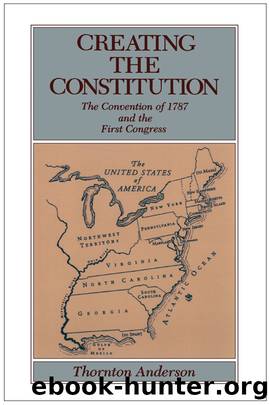Creating the Constitution: The Convention of 1787 and the First Congress by Thornton Anderson

Author:Thornton Anderson [Anderson, Thornton]
Language: eng
Format: epub
Tags: Americas, 18th Century, Legislative Branch, United States, Social & Cultural Studies, History, General, History & Theory, American Government, Political Science, Revolutionary Period (1775-1800), Modern, Politics, Nonfiction, Constitutions
ISBN: 9780271071312
Google: fu5Il3Zkx84C
Publisher: Penn State University Press
Published: 1993-11-29T05:00:00+00:00
Legislatorsâ Eligibility for Executive Offices
Throughout the eighteenth century the Country Whigs in England had complained that ministerial management of Parliament, by the appointment of its members to offices and sinecures, was a subversion of the traditional constitutional balance of the three branches of the mixed government. Following them, the American revolutionaries came to see this as a prime source of their great conflict with the mother country.
So it should occasion no surprise that the Virginia Plan had provided that both representatives and senators should be ineligible for âany office established by a particular State, or under the authority of the United States . . ., during the term of service, and for the space of __________ â thereafter (1:20â21). These provisions indicate that the Virginians were very aware of the need to protect the independence of the legislature against the type of executive influence that had developed in England, a view no doubt widely shared.26 Nevertheless a contrary view had great strength in the Convention. The ineligibility provision was assaulted repeatedly, from various angles, and in the end attenuated.
The provision against state offices seemed most vulnerable and was assailed on June 12, but it withstood this initial assault. The clause thus remained, but the narrow margin (5 to 4, with Massachusetts and Maryland divided) guaranteed that another trial would be made (1:217).
On June 22 Gorham attacked the whole idea of ineligibility as âunnecessary and injuriousâ (1:375). Butler opposed him, citing the British example: âThis was the source of the corruption that ruined their Govt.â Mason elaborated on the example: âcorruption pervades every town and village in the kingdom,â and concluded, âI consider this clause as the corner-stone on which our liberties dependâand if we strike it out we are erecting a fabric for our destructionâ (1:376, 381). For King, however, it was âa mere cobwebâ: âwe refine too much by going to utopian lengths.â Wilson, without using the name, reminded the delegates that Washington had been a member of Congress when chosen as commander of the Revolutionary armies.
It remained, however, for Gorham and Hamilton to show the real colors of their school of thought. âThe corruption of the English Government,â Gorham averred, âcannot be applied to America. This evil exists there in the venality of their boroughs: but even this corruption has its advantage, as it gives stability to their governmentâ (1:381). Hamilton agreed with Gorham that it was impossible to say what the effect of ineligibility would have been in England. âWe have been taught to reprobate the danger of influence in the British government, without duly reflecting how far it was necessary to support a good government.â He then cited David Hume, âone of the ablest politicians,â who had âpronounced all that influence on the side of the crown, which went under the name of corruption, an essential part of the weight which maintained the equilibrium of the Constitution.â27 Corruption was not really an evil. It was advantageous, according to this Mandevillean logic, even essential. Nevertheless the attempt
Download
This site does not store any files on its server. We only index and link to content provided by other sites. Please contact the content providers to delete copyright contents if any and email us, we'll remove relevant links or contents immediately.
Hollow Courts (2022) by Unknown(309)
The Crisis in America's Criminal Courts by William R. Kelly(281)
Mediation, Conciliation, and Emotions by Ladd Peter D.;Blanchfield Kyle E.; & Kyle E. Blanchfield(204)
I Dissent : Great Opposing Opinions in Landmark Supreme Court Cases by Mark Tushnet(198)
Equity and Gender by Ellen Frankel Paul(196)
Settling Disputes by Linda Singer(190)
A Lawyer in Indian Country by Alvin J. Ziontz(183)
The Nominee by Alan P. Woodruff(180)
How to Master Commercial Mediation by Richbell David;(179)
In Defense of the Constitution by George W. Carey(174)
Judge and Jury by WILLIAM BERNHARDT(172)
Madam Chief Justice by W. Lewis Burke Joan P. Assey(169)
The Puzzle of Unanimity by Corley Pamela C.;Steigerwalt Amy;Ward Artemus;(169)
Law, Courts, and Justice in America by Howard Abadinsky(166)
Public Actors in International Investment Law by Catharine Titi(163)
War Crimes and the Culture of Peace by Louise Arbour(157)
The National Security Court System by Sulmasy Glenn;(150)
Kaleidoscope by Alan P. Woodruff(149)
The Trial and Execution of Mark and Phillis, Slaves of Capt. John Codman by Abner Cheney Goodell(147)
